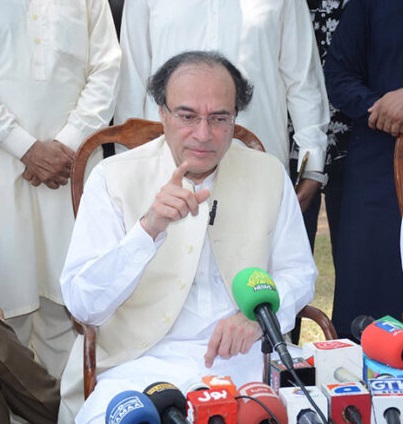Finance Minister Muhammad Aurangzeb, on Tuesday reaffirmed the government’s commitment to expanding the tax net to include more sectors while reducing tax exemptions. His comments followed the recent presentation of the federal budget for FY2024-25, which totals Rs18.9 trillion and aligns with IMF guidelines.
The new budget aims for a 3.6% GDP growth and sets a challenging Rs13 trillion tax collection target. It also raises taxes on salaried individuals and eliminates many existing tax exemptions. Aurangzeb, during the budget presentation, emphasized the need to broaden the tax base to avoid overburdening current taxpayers.
Addressing a press conference in Kamalia, Aurangzeb highlighted the unsustainability of the current 9.5% tax-to-GDP ratio, advocating for an increase to 13%. He noted that effective taxation is essential for the functioning of public institutions like schools, universities, and hospitals.
Aurangzeb outlined several strategies to achieve this goal, including imposing direct taxes in previously untaxed areas and cutting back on the Rs3.9 trillion in tax exemptions. He assured that key sectors such as health and agriculture would remain protected.
The minister also revealed that around 32,000 retailers have been registered and will be taxed starting in July. “No sector can remain untaxed,” he stressed, underscoring the necessity of an equitable tax system.
Acknowledging enforcement challenges, Aurangzeb called on the Federal Board of Revenue (FBR) to enhance its efforts. He cited poor implementation of the track and trace system as a major revenue loss factor and announced that consulting firm McKinsey has been collaborating with the FBR for the past month to improve digitalization and automation. This initiative aims to reduce human interaction, increase transparency, and minimize corruption.
Aurangzeb also addressed the fear of harassment and frivolous notices that deter people from joining the tax net, sharing his personal experiences from the private sector to highlight the issue.
In addition to tax reforms, the minister announced the upcoming privatization of the Karachi airport, expected by July or August, and plans to outsource other airports. He also mentioned the federal government’s intention to close ministries and departments that have been devolved to provincial authorities to reduce expenses and boost efficiency. The closure of the Pakistan Public Works Department, already announced by Prime Minister Shehbaz Sharif, is a significant step in this direction.
Aurangzeb further detailed plans to privatize state-owned enterprises (SOEs) to alleviate the financial burden on the government and improve operational efficiency. He highlighted Pakistan International Airlines (PIA), which has Rs622 billion in liabilities, as a prime candidate for privatization.
These initiatives reflect the government’s strategy to enhance fiscal stability, expand the tax base, and streamline operations to support sustainable economic growth.




